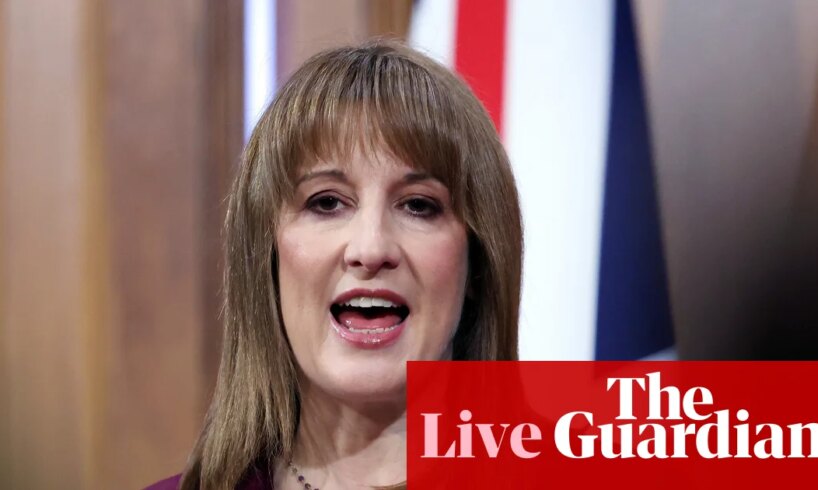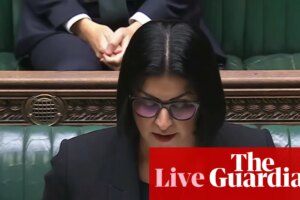
UK borrowing costs drop as Reeves speaks
The cost of UK borrowing is falling as Rachel Reeves outlines her priorities for this month’s budget.
The chancelllor’s promise that she has an ‘iron clad’ commitment to her fiscal rules is probably reassuring bond investors.
The yield, or interest rate, in UK 10-year bonds has dropped by 4.5 basis points (0.045 percentage points) to 4.39% this morning (from 4.43% last night).
The yield on 30-year bonds has dropped by 5 basis points, to 5.166%.
Those are relatively small moves, but certainly moving the way the Treasury would like to see.
UPDATE: Victoria Scholar, head of investment at interactive investor, says:
In an unusual address ahead of this month’s Autumn Budget, Chancellor Rachel Reeves tried to prepare voters for tax cuts by laying out the UK’s economic challenges.
She talked about how Tory-era austerity hurt years of capital investment and how productivity performance is weaker than previously estimated.
She said inflation is still too high and interest rates are still a constraint and government borrowing costs have increased. Reeves also said her commitment to the fiscal rules is iron clad, pushing 10-year and 30-year bond yields lower.
Share
Updated at 09.46 CET
Key events
Show key events only
Please turn on JavaScript to use this feature
Chart: Pound lowest since April against the US dollar
A chart showing the pound against the US dollar this year Photograph: LSEGShare
Quilter: Reeves prepared the ground for higher personal taxes
Rachel Reeves’s pre-Budget speech this morning was all about preparing the ground for some painful measures later this month, says Rachael Griffin, tax and financial planning expert at Quilter:
She knows this Budget will define her credibility, and her message today was clear that Britain’s finances are in a worse state than many realise, and everyone will be expected to play their part in putting them back on track.
Reeves was at pains to distance herself from the politics of austerity, arguing that deep cuts and short-term fixes are what weakened the country’s economic foundations in the first place. But while her argument against renewed austerity will appeal to many scarred by the last decade, it also lays the groundwork for a different kind of pain, which is higher personal taxes to rebuild public finances. She’s made it clear she is happy to be unpopular if it helps secure public finances.
Her insistence that ‘easy answers’ are off the table is a warning that there will be few giveaways in this Budget. The Chancellor is trying to convince both markets and the public that fiscal discipline can coexist with fairness, but for households already facing high borrowing costs and squeezed budgets, the idea of contributing more will still be a tough sell.
This was a speech designed to project authority and honesty, not to win popularity. The real challenge for Reeves will come when she has to translate that rhetoric into decisions that feel credible to investors but also tolerable for working families.
Share
Pound hits six-month low
UPDATE: The pound has hit a six-month low again the US dollar, losing almost half a cent to $1.3086.
It’s also weaker against the euro, down 0.3% this morning.
Sterling has weakened in recent days as City investors have begun to predict faster cuts in UK interest rates.
A rate cut at Thursday’s Bank of England meeting is now seen as a 35% possibility, up from 30% at the end of last week.
If Rachel Reeves succeeds in sticking to her fiscal rules, and raises taxes, that could encourage policymakers at the BoE to lower borrowing costs to protect the economy.
George Vessey, lead foreign exchange & macro strategist at Convera, explains:
“The pound has weakened notably over the past month, driven by a combination of softer UK data, heightened fiscal uncertainty, and a dovish recalibration of interest rate expectations.
Markets have increasingly priced in further easing from the Bank of England (BoE) as the prospect of looming tax rises grow. This has eased stress in the UK bond market though, dragging gilt yields lower.
Share
Updated at 10.03 CET
Reeves refuses to say she’ll stick to manifesto pledges on tax
Andrew Sparrow
Rachel Reeves has failed to say she’ll stick to the government’s manifesto pledges on tax.
Asked if she will stick to Labour’s manifesto promise not to raise the taxes that working people pay, the chancellor replied:
I will set out the individual policies of the budget until the 26th of November. That’s not what today is about. Today is about setting the context up for that budget.
And your viewers can see the challenges that we face, the challenges that are on a global nature. And they can also see the challenges in the long-term performance of our economy. And the Office for Budget Responsibility will set all that out. They’ve done the review of the supply side of the economy that looks at the past, but they use the past to predict the future.
As chancellor, I have to face the world as it is, not the world that I want it to be.
And when challenges come our way, the only question is the how to respond to them, not whether to respond, or not.
And as I respond on the budget 26 November, my focus will be on getting NHS waiting lists down, getting the cost of living down and also getting the national debt down.
Share
Reeves is taking questions from the press pack now, pledging to be honest with people, and put the national interest first.
She says the focus on the budget is on “getting the debt down, getting NHS waiting lists down and getting the cost of living down.”
Share
The message from Rachel Reeves today is that “Each of us must do our bit”.
She hasn’t explicitly said that she plans to raise taxes later this month (but she’s also not denied it!), saying:
If we are to build the future of Britain together, we will all have to contribute to that effort.
Each of us must do our bit, for the security of our country and the brightness of its future.
Share
Rachel Reeves wound up her speech by promising to do what is right, not what is popular.
She pledges the budget on 26 November will be a budget for growth that supports businesses to innovate.
And she promises to do “what is necessary to protect families” as she takes decision on tax and spending.
Share
UK borrowing costs drop as Reeves speaks
The cost of UK borrowing is falling as Rachel Reeves outlines her priorities for this month’s budget.
The chancelllor’s promise that she has an ‘iron clad’ commitment to her fiscal rules is probably reassuring bond investors.
The yield, or interest rate, in UK 10-year bonds has dropped by 4.5 basis points (0.045 percentage points) to 4.39% this morning (from 4.43% last night).
The yield on 30-year bonds has dropped by 5 basis points, to 5.166%.
Those are relatively small moves, but certainly moving the way the Treasury would like to see.
UPDATE: Victoria Scholar, head of investment at interactive investor, says:
In an unusual address ahead of this month’s Autumn Budget, Chancellor Rachel Reeves tried to prepare voters for tax cuts by laying out the UK’s economic challenges.
She talked about how Tory-era austerity hurt years of capital investment and how productivity performance is weaker than previously estimated.
She said inflation is still too high and interest rates are still a constraint and government borrowing costs have increased. Reeves also said her commitment to the fiscal rules is iron clad, pushing 10-year and 30-year bond yields lower.
Share
Updated at 09.46 CET
Reeves promises ‘iron clad’ commitment to fiscal rules
Rachel Reeves then insists that her commitment to her fiscal rules is “iron clad” – a signal to the financial markets that she will not sign off a debt splurge in this month’s Budget.
She explains that £1 in every £10 of government spending goes on servicing the national debt.
And she argues against calls for more borrowing, pointing out that there is a limit that banks and pension funds will pay for UK debt.
She says:
“The more we try to sell, the more it will cost us.”
Reeves also pledges not to repeat the mistakes of the “cycle of austerity and decline” which has led the UK to its current situation.
Share
Although interest rates have been cut five times this parliament (from 5.25% to 4%) they are still a constraint on the economy, Reeves says.
[The Bank of England is due to set rates again on Thursday].
Share
In another criticism of previous governments, Rachel Reeves warns that years after austerity has led to capital investment being sacrificed.
Share
Source





